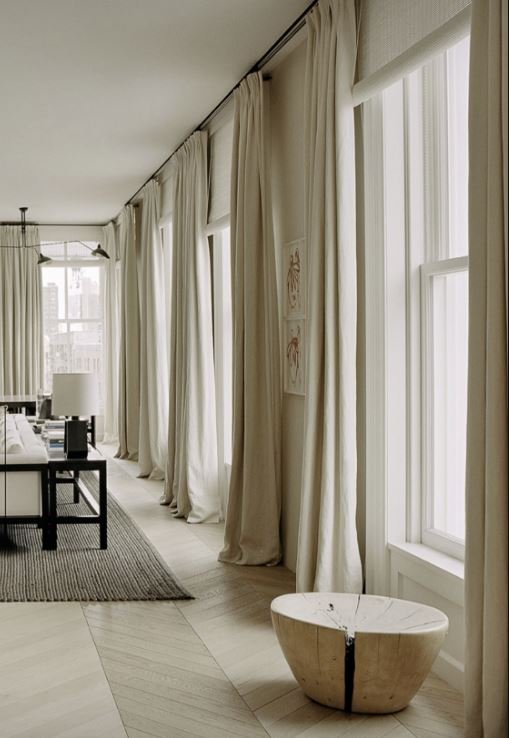The Design Trick No One Talks About: How to Hide or Highlight Unused Doors
Let me ask you this: Have you walked into a room that felt off—but couldn’t quite put your finger on why?
Maybe it’s the furniture, maybe it’s the lighting... or maybe, just maybe, it’s that awkward, useless door that seems to exist for no reason at all.
You know the one.
The door that leads nowhere. The door that was once functional but now just takes up space. The door that interrupts your perfectly planned layout, refusing to be ignored.
And here’s the thing: you don’t have to live with it.
You don’t have to knock it down or accept it as an unchangeable flaw. You just need to get creative.
Because when you stop seeing that door as a problem—and start treating it like an opportunity—that’s when your home starts to make sense again.
The Airbnb Door Dilemma (AKA: When a Door Kills the Vibe)
I ran into this exact issue with a recent Airbnb project.
The space was great—open, airy, filled with potential. But then… there it was.
A door that led to absolutely nothing.
It sat there like an afterthought, interrupting the flow of the room and screaming to be dealt with.
But instead of ripping it out (which would’ve been expensive, messy, and completely unnecessary), we found a better way—one that made the space feel intentional, effortless, and beautiful.
Now, I’m passing that solution to you.
Step 1: Decide—Hide It or Highlight It?
First things first: not every door needs to disappear.
Some should be camouflaged. Others? Turned into a statement.
Ask yourself:
✔ Does this door interrupt the design of the space? (Hide it.)
✔ Could this door be repurposed into something useful? (Highlight it.)
✔ Would removing or covering it improve how the room feels? (Yes? Keep reading.)
Once you know what you’re working with, it’s time to get creative.
Step 2: If You Want It Gone… Hide It Like a Pro
Want the door to disappear completely? Make it look like it was never there.
01 | The Bookcase Trick (AKA: “What Door?”)
A bookcase over the doorframe is the easiest way to do this—plus, it adds storage (because let’s be real, we all need more storage).
✔ Pro Tip: If you want that built-in look, go for a snug fit or a custom shelving unit. No one will ever suspect there’s a door hiding behind it.
Next-level move? Add hinges and turn it into a secret passageway. (Because who doesn’t want a secret door in their house?)
Image | Keyaira Terry
Option 2. The Curtain Disguise
If you’re renting or want zero commitment, curtains are your best friend. But let’s make sure they look intentional, not like a last-minute cover-up.
Three ways to pull this off:
✔ Pro Tip: Stick to linen or textured fabrics for a more organic, high-end feel.
Image | AbbeyByDesignCo
Image | Pinterest
Ceiling-Mounted Rod:
Option 3: The Wallpaper Camouflage
For the ultimate “Wait… there was a door here?” moment, use wallpaper to blend it into the background.
Go neutral and subtle for a seamless look—or make it a statement wall that turns the whole area into an intentional design feature.
✔ Pro Tip: Removable wallpaper is a game-changer, especially if you love to switch things up.
Image | markdsikes
Step 3. If You Want It to Stand Out… Own It
Sometimes, the best way to deal with an unused door is to turn it into art.
Here’s how:
Option 1: The Tapestry Cover-Up
A woven textile, bold fabric, or framed piece over the door can add texture and depth to the space—while also solving your door dilemma.
Best part? It looks intentional, not like you’re hiding anything.
✔ Pro Tip: Choose a piece that reflects your personal style so it feels curated, not random.
Bold
Image | Homeedit
…and Beautiful
Image | Pinterest
Drape Your Space
Image | Pinterest
Option 2: The “Functional” Door
Why let a door just sit there when it could actually do something?
Try this:
Turn it into a mirror (instant light + depth)
Hang a floor-length piece of art over it
Use it as a leaning backdrop for styling décor
✔ Pro Tip: Lean a tall mirror or art piece against the door instead of mounting it—it’ll give you flexibility to change it up later.
Option 3: The Statement Color Move
Want to make it pop instead of making it disappear? Paint it.
Go bold. Go unexpected. Own the fact that the door is there.
A deep green, a warm terracotta, a striking black—suddenly, it’s a feature, not a flaw.
✔ Pro Tip: This works best if the door is in a space that can handle a little extra personality.
The Airbnb Fix: What We Actually Did
After brainstorming, my Airbnb client and I found the perfect fix:
✔ Ceiling-mounted rod from Amazon (no-damage, renter-friendly)
✔ Linen drapes from a second-hand shop—for just $10 (yes, really)
And just like that? Door, gone.
No demolition. No expensive reno. Just smart, intentional design.
Your Home, Your Rules—What’s Your Move?
If you’ve got an awkward, useless door in your home, you’ve got options.
You just have to decide—hide it, highlight it, or transform it?
Want a Pro to Help You Figure It Out?
For a full home transformation: Book a Mindful Home Creator experience.
Need a fast design fix? Try Design Mood and get solutions in one consultation.
Because in design (and in life), there’s always a way to make things work for you.
Now go reclaim your space. You got this.
DIVE DEEP INTO OUR ARCHIVES









